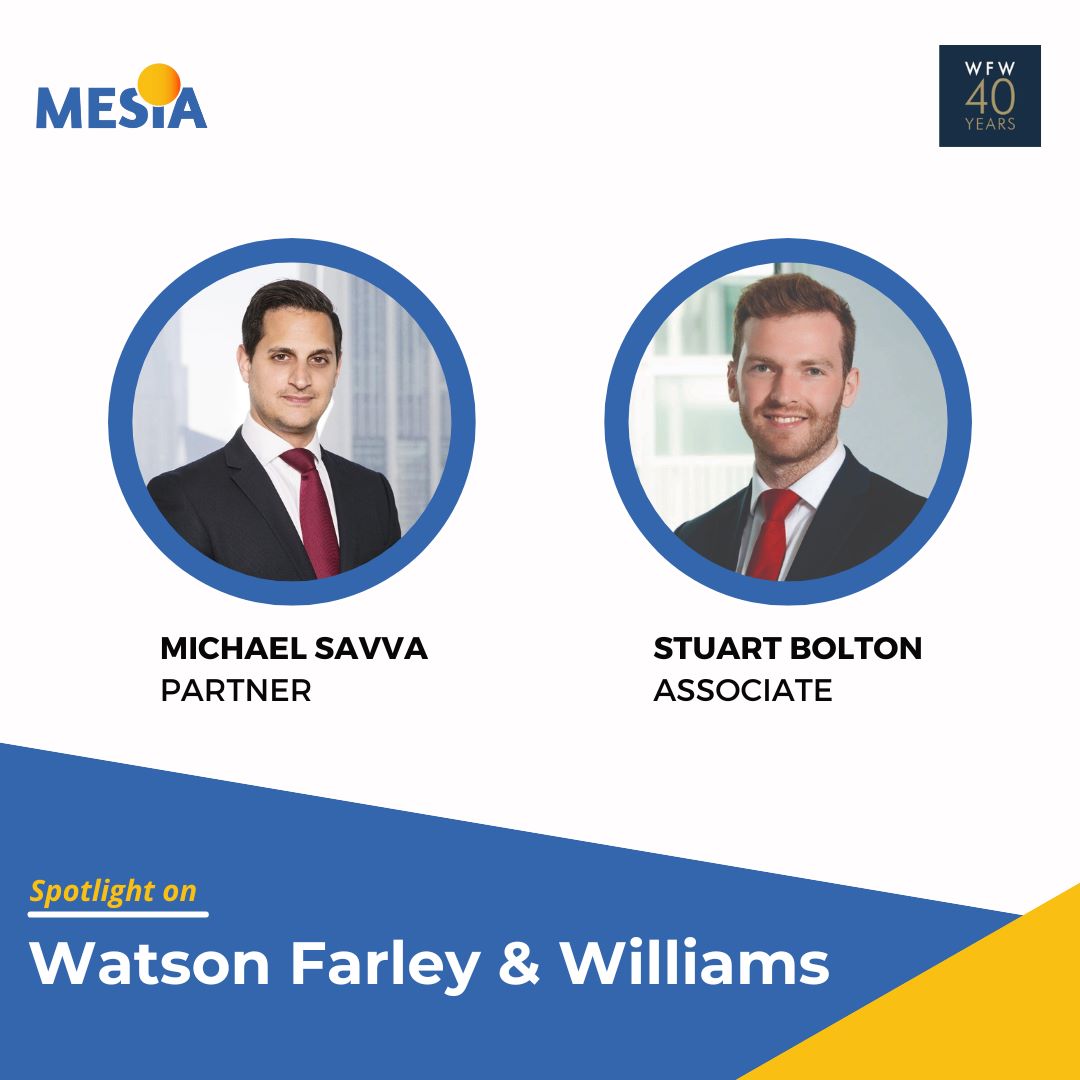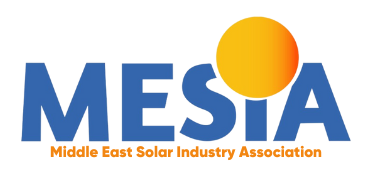Spotlight on Michael Savva, Partner and Stuart Bolton, Associate at Watson Farley & Williams

Please describe your role at Watson Farley & Williams and expertise in the sector?
MS: I'm a Partner in the Assets and Structured Finance group at WFW, based in our office in Dubai, and am responsible for developing our business lines in a variety of different sectors. For those who do not know much about WFW, we are an international law firm whose principal strategic focuses and specialisms are in the energy and transport sectors. This is reflected in the work we do in the Middle East region and surrounding emerging markets. In the solar and renewables sector in particular, we have to date focused locally on structured portfolio financings of distributed solar projects in the UAE and across the ME, which combine "pure" project finance features with portfolio financing features prevalent in other sectors we work in (which is important as such "portfolio" financings are still pretty rare in this region and this market).
SB: I’m an Associate in the structured finance group at WFW. My day-to-day role principally involves structuring and negotiating transactions and drafting finance documents. However our matters are complex and given they involve a fixed asset, necessitate a working knowledge of others areas of law, for example regulation, construction and real estate. My experience in solar is principally in relation to structured portfolio financings of distributed solar projects in the UAE and across the ME.
How did your story in renewables begin and in your opinion, how much has it changed since then, if at all?
SB: My story in renewables is relatively recent. My background is in structured finance, across a range of asset backed industries, principally aviation, energy and sport, as well general corporate finance. As a trainee in London I worked on significant energy transactions in solar and wind, one with a Middle East private equity firm, however my substantial experience in renewables started a couple of years ago on a portfolio solar financing. The transaction was very interesting, the first of its type in the Middle East and I worked with a pioneering and particularly shrewd client. My interest in solar grew from then, but I feel having a more diverse background has benefitted me – it has been interesting to apply principles that have been developed in finance law across the more mature asset classes to solar portfolios. The distributed solar portfolio market is still too nascent to have entrenched positions and so there isn’t really a market standard as such. This gives us the chance to influence structures and challenges us to think of novel ways to add value to transactions. Even in this short time the growth in interest in our particular area of the market has been very noticeable.
MS: Again, pretty recent, and really has come about as a result of three complimentary factors – the firm's growing strategic focus in energy and renewables globally, the development of WFW's Middle East presence in Dubai (I was part of a team of 3 who moved over from London to open the office in 2014 and we have grown to a team of around 25 people now, and with the desire to grow that still further), and a like-minded growing interest in the renewables sector from clients who we work with in other sectors. All of that has meant that, certainly in the last 2-3 years, we have really been focusing on the renewables sector and growing our renewables practice by partnering with clients (both on the bank-side and the developer-side) to advance their businesses in that sector, in particular through the development of their suite of project documents, their access to finance, and legal advice related to those aspects.
Can you tell us about your most advanced solution or service and what sets you apart from other competitors?
MS: From a business perspective, our "sell" is our global, single-firm/single-partnership approach, which means that clients get access to our expertise not just in any one market or geography, but globally wherever the most relevant and most appropriate expertise sits. That sets us apart from some (albeit not all) other firms, I appreciate. From a personal perspective, we are told by our clients and contacts in the sector that we are extremely easy to work with, very commercial, and understand the clients' businesses, which helps us to partner with them and to tailor legal and regulatory solutions to the specific issues they face, which is important when addressing issues in such a niche and nascent market such as distributed solar portfolio market, as there is no well-trodden path to follow. And from a legal and regulatory perspective, we are one of the only law firms who have been consulted on the drafting and development of a number of recent and upcoming laws and regulations in the UAE, including the secured transaction law and the proposed new financial leasing law, which have implications on the financing landscape for distributed rooftop solar assets in particular, so we are at the forefront of regulatory developments in this area.
SB: “Solution” may be a strong word, but I would hope what sets us apart is our ease to work with. In my, admittedly relatively junior view, the best thing lawyers can be is helpful. We are transactional lawyers, everyone in the deal has the same goal (i.e. to close the transaction). Spending hours arguing about minute points that won’t ever arise, or will inevitably be addressed commercially if they do, doesn’t help clients. We try and be easy to get on with and mindful to attach appropriate amounts of time to particular workstreams.
What's a recent milestone Watson Farley & Williams has achieved that you would like to share with us?
SB: We recently celebrated our 40th anniversary. We are a relatively young firm in that respect, and our physical presence in the Middle East only stretches back 8 years. We think we have a lot of space to grow and are particularly excited about our flourishing renewable energy offering in the Middle East, leveraging our more established reputation in Europe and Asia.
MS: As Stuart mentions, it was very nice of the firm to put on a wonderful 40th birthday party for me this summer (at least that's my take on it!). It is slightly strange that the firm is the same age me, but I hope that demonstrates the firm is still relatively young! Our renewables practice is regularly recognised for acting on award winning deals. Recent accolades include European solar refinancing Deal of the Year (IJ Global 2020), European solar refinancing CSP Deal of the Year (IJ Global 2020), Renewable Deal of the Year – Ground Mounted Solar (The Asset Triple A Infrastructure Awards 2021).
What are your expectations for the MENA region in terms of growth and new opportunities for Watson Farley & Williams?
MS: We see the MENA region as a particularly strong growth area, in particular when it comes to energy and renewables. WFW is investing heavily in further developing our energy and renewables offering in the MENA region. We have recently hired Alhassane Barry (https://www.wfw.com/people/alhassane-barry/) as a Partner in our Project Finance practice and are growing that practice at the moment, as well as developing a more corporate/projects-focused offering to dovetail with that (more to come on that in due course!). In terms of the market, the number of projects and tenders announced in the UAE, the Middle East more generally and in Africa demonstrate that this is an area which will only continue to go from strength-to-strength. The solar energy sub-sector of the renewables market is, itself, very broad, from the larger giga projects, C&I, distributed solar, as well as residential and even floating solar, each of which have their own nuances but all of which are expected to grow. Beyond that, the UAE's wish to be a hydrogen "hub" will result in tremendous growth if the technology and projects develop in the manner envisaged. COP 27 is in Egypt this year and COP 28 will be held at Dubai Expo City in the UAE next year, so climate (and, by extension, energy transition) is very much on the political and economic agenda in the region, and is evident from the amount of investment that is expected to continue to be put into the renewables sector in the region going forward. We anticipate that breadth of our expertise and geographical remit will result in opportunities for WFW to be involved in many of these projects and initiatives.
SB: The niche market we operate in will grow exponentially. We therefore need to ensure we retain our slice of the bigger pie. However green financing is also an exciting prospect for the next decade or so, and we will also seek demonstrate our expertise in th area, particularly green bonds.
As governments are increasing their targets towards a more sustainable future. From your perspective, what are the challenges that corporations could face in the way of achieving those targets?
SB: Probably transport. Depending on the measure, transport accounts for a fifth to a quarter of global carbon emissions. China’s dominance of the solar panel market means even the solar industry is accountable for significant carbon production. Companies who are most committed to meeting their sustainability targets do have options of meeting these challenges though, for example being willing to purchase green freight, even if higher priced, or offset their transport carbon emissions.
MS: Questions like this become all the more topical in economic environments such as the one we find ourselves in currently! With inflationary pressures the way they are, high commodities prices, and challenges in logistics and supply chains, transitioning to cleaner energy may become a more expensive endeavour in the short term, which corporations may need to navigate through before reaping the benefits down the line.
ABOUT WATSON FARLEY & WILLIAMS
Drawing on years of experience across all segments of the energy sector, from conventional power, infrastructure, oil and gas and mining to commodities and renewables with a particular focus on solar and wind, Watson Farley & Williams excel in providing end-to-end advice in all aspects of these complex, cross-border transactions and disputes.
An exceptional understanding of the industry and its commercial drivers equips us to give technically excellent advice on transformative and ground-breaking projects. In particular, across M&A, joint ventures, planning, construction and operational contracts, risk identification/mitigation, financing, insolvency, restructuring, regulatory, tax and dispute resolution.
Our clients range from energy companies, financial institutions, institutional investors, sponsors, governments and contractors whom we advise across a range of domestic and cross-border projects including some of the most innovative and marquee transactions in the market.
With sustainability high on the agenda, our award winning renewables practice is well positioned to advise organisations who want to diversify their portfolios and/or invest in this fast moving sector of the energy industry.
